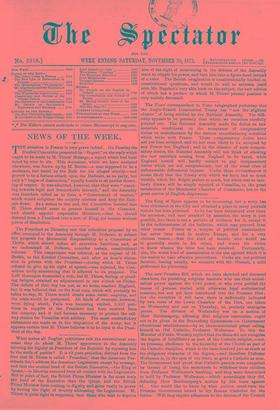The Times' correspondent in Paris telegraphed yesterday that the Anglo-French
Commercial Treaty has "not the slightest chance" of being ratified by the National Assembly. The diffi- culty appears to be precisely that which we ourselves carefully pointed out. The National Assembly made the duties on raw materials conditional on the acceptance of compensatory duties on manufactures by the various manufacturing countries which trade with France. Those compensatory duties have not yet been accepted, and do not seem likely to be accepted by any Power but England ; and in the absence of such compen- satory duties, the National Assembly will not think of allowing the raw materials coming from England to be taxed, while England herself will hardly submit to pay compensatory duties which are not compensatory, but of the worst class of unfavourable differential imposts. Under these circumstances it seems likely that the Treaty with which we have had so much trouble, which Mr. Bright praises so much, but which was so care- lessly drawn, will be simply rejected at Versailles, to the great satisfaction of the Manchester Chamber of Commerce, but to the great sorrow of English shipowners.


































